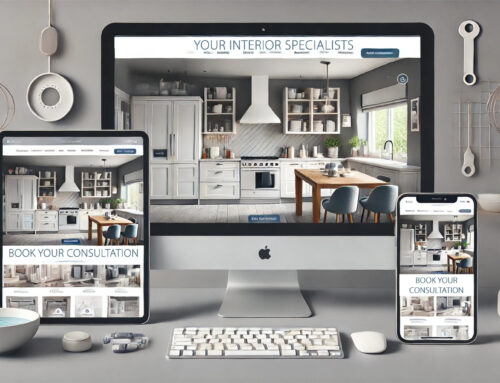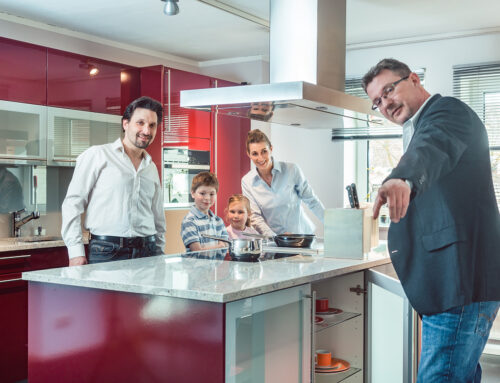Paid Search or Paid Social?
Latest Articles,Marketing Tips
November 6, 2024
Why Harnessing Both Facebook and Google Advertising is Essential for Your KBB Showroom’s Success
For small Kitchen, Bedroom, and Bathroom (KBB) showrooms, advertising has evolved from traditional print media to powerful digital platforms like Facebook and Google Ads. Each platform brings unique strengths, histories, and strategies, and understanding how to combine them is key to maximising customer reach, engagement, and return on investment (ROI). Leveraging both Facebook and Google Ads can enhance your visibility, target new customers, and drive footfall to your showroom, allowing your business to thrive in a competitive market.
A Brief History of Google and Facebook Ads
Google Ads was launched in 2000, pioneering search engine advertising. Google Ads enables businesses to reach potential customers based on their search intent. For example, if someone searches for “Cambridge kitchen showrooms,” Google Ads can position your business at the top of the search results, capturing active buyers precisely when they are looking for your products or services.
Facebook Ads, introduced in 2007, operates on a different principle. Rather than search intent, Facebook focuses on social engagement and user interests. Over the years, Facebook has refined its algorithm to offer in-depth audience segmentation, allowing advertisers to target users based on demographics, location, interests, and even life events. For a KBB showroom, this means you can reach potential customers who may not be actively searching but are within your geographic area and interested in home improvement.
The Core Differences: Intent vs. Discovery
- Google Ads: Intent-Based Advertising – Google Ads is ideal for capturing users actively looking for products or services. It targets potential customers through keywords that match their search queries, displaying your ad at the top of search results. For a KBB showroom, this could mean targeting keywords like “kitchen installation Cambridge” or “bespoke bathroom design.” Google Ads’ strength lies in finding people ready to make a purchasing decision.
- Facebook Ads: Discovery-Based Advertising – Facebook Ads, on the other hand, excels in discovery. Users may not be actively searching for KBB products, but Facebook’s advanced targeting helps reach individuals based on their interests and behaviours, such as “home renovation” or “interior design.” Through Facebook Ads, potential customers find you—often when they’re in the early stages of planning or inspiration, making Facebook an ideal channel for nurturing long-term customer relationships.
Reaching New Customers: Google Helps Them Find You, Facebook Brings You to Them
For a small KBB showroom, the goal is to generate qualified leads and drive showroom visits. Here’s how each platform assists:
- Google Ads Helps New Customers Find You: Google captures potential buyers actively seeking solutions and directs them straight to your website or showroom. Because users are already in the market for what you offer, these leads often convert faster, leading to a higher ROI. Google’s ad format (text-based search ads and product-based shopping ads) also allows for straightforward messaging and direct calls to action, crucial for local searches.
- Facebook Ads Brings You to New Customers: Facebook enables you to create ads with visually engaging content that shows your products in real-life settings, such as remodelled kitchens or bathrooms. Users may not be in immediate buying mode, but by showcasing what you offer in their social feed, you create brand awareness and become a go-to showroom when they decide to renovate.
Understanding ROI Differences Between Google and Facebook Ads
When evaluating ROI, Google Ads generally offers quicker returns due to its intent-based targeting, while Facebook Ads contributes to long-term brand-building and customer loyalty. A well-optimised Google campaign can lead to immediate conversions, but it’s often costlier per click due to high competition on certain keywords. Facebook Ads, however, tends to have lower costs per click or impression, making it more affordable for creating broad brand awareness.
Combining these platforms can yield the best of both worlds:
- Use Google Ads to capture ready-to-buy customers and drive immediate traffic to your website or showroom.
- Use Facebook Ads to stay top-of-mind, increasing the likelihood of your business being chosen when customers start planning a purchase.
Maximising Ad Efficiency: Targeting, SEO, and Bidding
To maximise returns from Google and Facebook Ads, optimising targeting, SEO, and bidding strategies is crucial. Here’s how to keep your ad costs low while boosting reach and engagement:
- Targeting:
- In Google Ads, use specific keywords relevant to your showroom’s offerings, like “custom kitchen design in Cambridge.” Avoid broad terms that could dilute your ad budget. Use geo-targeting to focus on customers within driving distance of your showroom.
- In Facebook Ads, create custom audiences based on user interests, demographics, and geographic location. Retarget users who have visited your website or engaged with your previous content to stay connected with potential customers.
- SEO to Reduce Ad Costs:
- For Google Ads, optimising your website’s SEO can lower ad costs by improving your Quality Score. Google rewards relevant, high-quality websites with lower ad bids, so ensure that your website contains keywords that match your ad’s targeting.
- SEO also helps your Facebook Ads, as users are more likely to interact with ads that lead to a well-organised and informative website, improving ad performance metrics.
- Bidding Strategies:
- In Google Ads, bidding can be competitive. If you’re a smaller showroom, consider using automated bidding, such as Google’s Maximise Conversions, which optimises bids based on your set budget.
- On Facebook Ads, start with a small daily budget and monitor ad performance before scaling up. Facebook’s algorithm learns which users are more likely to engage with your ad, allowing it to optimise bids over time for better cost efficiency.
- Automating Campaigns:
- Google‘s Performance Max (PMax) is an all-in-one campaign type that leverages machine learning to maximise conversions across Google’s entire inventory, including Search, Display, YouTube, and more. For a KBB showroom, PMax can streamline and optimise ad performance by automatically finding and targeting potential customers across multiple platforms, ensuring your ads reach the right audience at the right time to drive more showroom visits and enquiries.
- Facebook’s Advantage+ campaigns leverage advanced machine learning to optimise ad placements and audience targeting, automatically delivering ads to the most relevant users across Facebook and Instagram. For a KBB showroom, Advantage+ can help drive more qualified leads by adjusting in real-time to reach potential customers who are most likely to engage, reducing manual adjustments and maximising ad performance efficiently.
Leveraging Both Platforms for Success
By integrating both Google and Facebook Ads, you create a comprehensive marketing funnel. Google Ads captures high-intent customers who need your products now, while Facebook Ads cultivates awareness and keeps your brand in front of potential customers who may not yet be ready to purchase but could be in the near future.
Ready to Boost Your Showroom’s Reach?
Harnessing the power of both Facebook and Google Ads can give your KBB showroom a significant edge in today’s competitive market. By balancing intent-driven and discovery-based advertising, your showroom can attract new customers, stay top-of-mind, and drive steady footfall.
If you’re ready to elevate your showroom’s presence, I’d love to discuss how we can tailor a dual-platform ad strategy for you. Contact me today to get started on optimising your showroom’s reach!
If you would like to discuss the your marketing activities as an independent, please drop me a line at terry@cloud3.co.uk or give me a call on 07747 016264.




